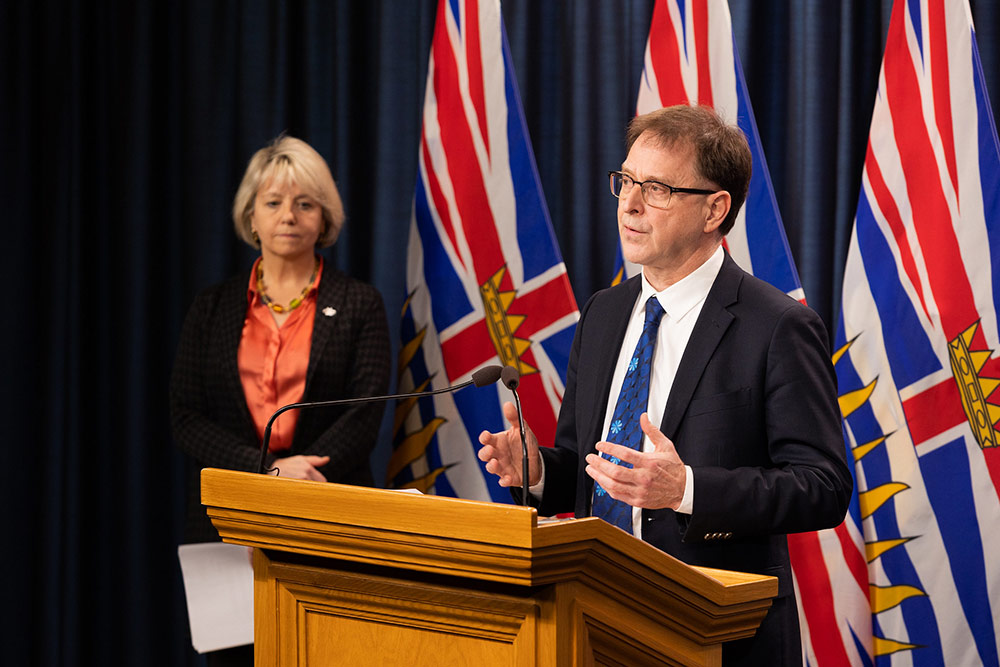Indoor gatherings with unvaccinated people were banned and the vaccine card program expanded as B.C. announced new restrictions today to prevent the rapid spread of the Omicron COVID-19 variant over the holidays.
Provincial health officer Dr. Bonnie Henry announced a limit on indoor gatherings among vaccinated people to one household plus 10 more people. Unvaccinated people are not permitted to socialize indoors outside their own households.
“If you are unvaccinated or a member of your family is unvaccinated, we cannot have personal gatherings in those settings right now,” she said. The ban does not apply to children under five who are not yet eligible to be vaccinated.
The proof-of-vaccination requirement will also expand to events with fewer than 50 people, including weddings and memorials, and venues with capacities of more than 1,000 will be slashed to 50-per-cent occupancy.
All organized New Year’s Eve parties are cancelled, and mingling between tables at restaurants is again prohibited.
Sports tournaments and related travel are cancelled for youth and adults, but individual games are permitted.
All restrictions take effect at midnight Sunday and will last through the end of January, Henry said.
But B.C. has not moved up the timeline for third “booster” doses of vaccines, as other provinces like Ontario have, and more news on the province’s rapid testing strategy won’t come until Tuesday.
Ontario announced tougher restrictions today, including a requirement that stores, malls, restaurants and bars operate at 50-per-cent capacity.
The Omicron variant, estimated to be at least twice as transmissible as the Delta variant, is on its way to becoming the dominant strain in B.C. within the next week, Henry said in a hastily scheduled briefing today.
“Right now, we need to slow the spread and ensure our health-care system and our communities are protected,” she said. “It is moving quickly and so must we.”
There were 302 confirmed cases of the Omicron variant in B.C. as of Friday. The actual number is almost certainly higher, as whole genome sequencing needed to confirm the strain takes several days.
“We know what we need to do and we have been here before,” said Henry. “This new variant has put us in this situation again.”
On Tuesday, the province presented a worst-case modelling scenario that would see as many as 2,000 new cases and 100 new hospitalizations each day by early January.
And in the last week, B.C.’s rolling average of new cases has risen from 350 to about 490 each day.
Independent experts have been sounding the alarm on the risk of Omicron cases overwhelming hospitals. They have said today’s measures will not be enough to avert a growing fifth wave.
Dr. Lyne Filiatrault of Protect Our Province BC said Thursday that B.C. needs to move up the timeline for third booster doses and make rapid tests widely available to reduce transmission.
“The reality is, if we base it on what’s been happening the last several waves, we’ve always been two steps behind,” said Filiatrault, a former emergency physician credited with a significant role in avoiding the SARS epidemic in Vancouver. “And now we need to be two steps ahead.”
Boosters are key because early evidence from the United Kingdom suggests three doses of Pfizer offers 70-per-cent protection against serious illness from Omicron, compared to 40-per-cent protection from two doses. By comparison, two doses of Pfizer affords approximately 80-per-cent protection against serious illness from the Delta strain.
Gosia Gasperowicz, a developmental biologist and a researcher at the faculty of nursing at the University of Calgary, said even if Omicron causes less severe illness than Delta, which some evidence suggests, its higher transmissibility will still produce a surge in cases that overwhelms hospitals.
“Overall it will generate more hospitalizations and more deaths,” she said of the Omicron strain.
Booster vaccine doses are currently available to anyone in B.C. aged 65 and over whose second dose was more than six months ago, as well as Indigenous people over 18, health-care workers and people deemed clinically extremely vulnerable.
About 13.2 per cent of British Columbians had a booster dose as of Friday afternoon.
By contrast, Ontario is opening third doses to anyone 18 and older starting Monday in response to Omicron, and Albertans over 50 are already eligible for a third shot.
But Henry and Health Minister Adrian Dix said the B.C. booster schedule would continue to prioritize those most at risk and aim for everyone to have a third shot between six and eight months after their second.
Henry cited evidence that a longer interval between second and third doses provides more robust, long-lasting immunity as part of her decision.
“We are going to be living with this virus for a very long time, so we want to give the best, the strongest, the longest-lasting protection,” she said. ![]()
Read more: Coronavirus, BC Politics
















Tyee Commenting Guidelines
Comments that violate guidelines risk being deleted, and violations may result in a temporary or permanent user ban. Maintain the spirit of good conversation to stay in the discussion.
*Please note The Tyee is not a forum for spreading misinformation about COVID-19, denying its existence or minimizing its risk to public health.
Do:
Do not: